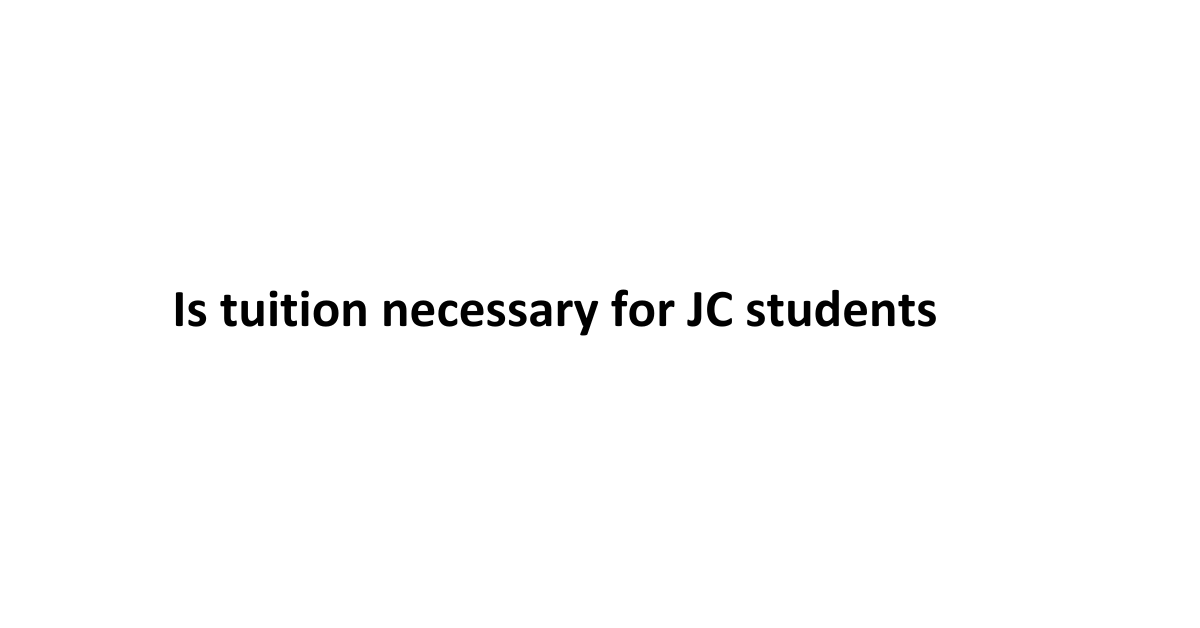
04 Oct Is tuition necessary for JC students
As students transition from secondary school to junior college (JC) in Singapore, they often face increased academic challenges and higher expectations. With the rigorous curriculum and the pressure to perform well in the A-level examinations, many students and their parents contemplate whether seeking tuition is necessary. In this article, we will explore the pros and cons of tuition for JC students and help you make an informed decision.
The Benefits of Tuition for JC Students
- Additional Support: One of the primary advantages of tuition is the extra support it provides. JC students encounter more complex subjects and may struggle with certain topics. Tuition can offer personalized attention, allowing students to clarify doubts and gain a better understanding of the material.
- Structured Learning: Tuition centers and private tutors often follow a structured curriculum. This can be beneficial for JC students, as it ensures that they cover all the necessary topics and stay on track with their studies.
- Exam Preparation: A-level examinations are crucial, and tuition can assist students in preparing thoroughly. Tutors are experienced in teaching exam techniques and can provide practice papers and tips on time management during exams.
- Peer Interaction: Group tuition sessions allow JC students to interact with their peers. This can be advantageous as students can discuss challenging concepts, share study strategies, and learn from one another.
- Boost in Confidence: Tuition can boost a student’s confidence, which is essential for tackling challenging subjects. As students improve their understanding and performance, they become more self-assured in their abilities.
The Drawbacks of Tuition for JC Students
- Financial Costs: Tuition, whether in a group setting or with a private tutor, comes at a cost. Some families may find it financially burdensome to invest in tuition on top of school fees and other educational expenses.
- Time Commitment: JC students already have demanding schedules. Adding tuition to the mix can lead to long hours of studying and reduced time for extracurricular activities, hobbies, or relaxation.
- Overreliance: While tuition can be beneficial, some students may become overly reliant on it. They may start to believe that they cannot succeed without tuition, which can hinder their independence and problem-solving skills.
- Burnout: The pressure to excel academically can sometimes lead to burnout, especially if students are juggling school, tuition, and other commitments. It’s crucial to strike a balance between studying and maintaining one’s well-being.
Factors to Consider
- Academic Performance: Evaluate your child’s current academic performance. If they are consistently struggling or failing in specific subjects, tuition may be a helpful intervention to address their weaknesses.
- Learning Style: Consider your child’s learning style. Some students thrive in a structured classroom environment, while others may prefer self-study. Tailor the decision to your child’s individual needs.
- Budget: Assess your financial situation. Determine if you can comfortably afford tuition without straining your family’s finances. Look for affordable options or alternatives if necessary.
- Motivation and Independence: Consider your child’s motivation and independence. If they are proactive in seeking help, self-study, and addressing their academic challenges, they may not require extensive tuition.
- Communication: Have an open and honest conversation with your child. Discuss their feelings, concerns, and preferences regarding tuition. Ensure that they are comfortable with the decision.
Alternatives to Tuition
If you are hesitant about enrolling your JC student in tuition, there are alternative strategies to consider:
- Self-Study: Encourage your child to take responsibility for their learning. Provide them with the necessary resources and a conducive study environment at home.
- Peer Study Groups: Encourage your child to form study groups with their classmates. Collaborative learning can be effective in understanding difficult concepts.
- Online Resources: Utilize online resources, such as educational websites, forums, and video tutorials. Many online platforms offer free or affordable study materials.
- Consultation with Teachers: Schedule meetings with your child’s JC teachers to discuss their academic progress and areas that need improvement. Teachers can provide guidance and additional resources.
In Conclusion
The necessity of tuition for JC students varies from individual to individual. While tuition can offer valuable support and benefits, it is not always mandatory for success. Consider your child’s unique needs, budget, and preferences when making this decision. It is essential to strike a balance between seeking external help and fostering your child’s independence and self-motivation in their academic journey. Ultimately, the goal is to ensure that your JC student receives the support and resources necessary to excel academically while maintaining a healthy work-life balance.



Sorry, the comment form is closed at this time.